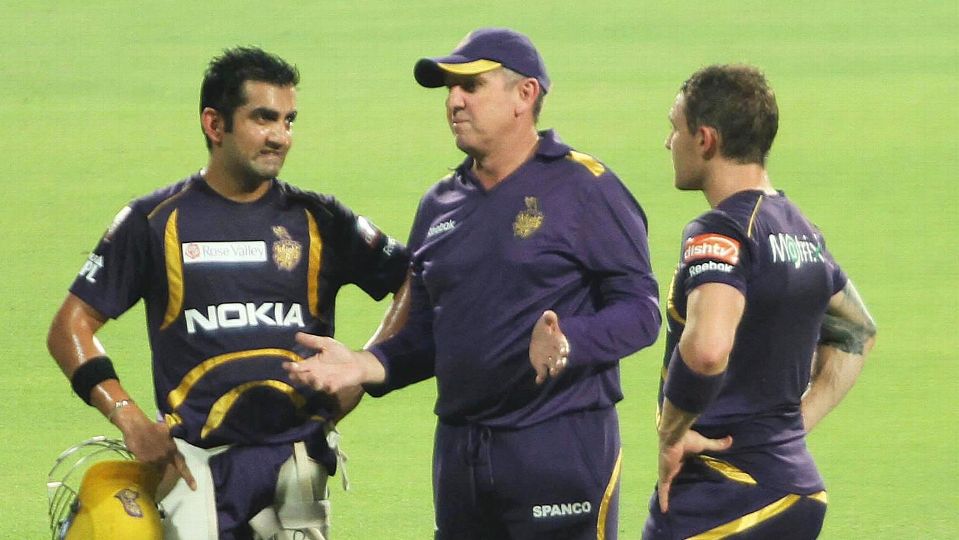
Trevor Bayliss' appointment by England will reunite a coaching unit whose bond was strengthened through one of the darkest moments in modern sport.
Paul Farbrace, who remains as England's assistant coach, fulfilled a similar role with Sri Lanka under Bayliss. But as well as guiding the team to some success - Bayliss was still there when they reached the 2011 World Cup final and rose to No.2 in the Test rankings - the pair were both in the team bus when it was attacked by terrorists in Lahore in 2009. Six members of the team were hurt and six policemen and two civilians killed.
Having experienced such a traumatic event together, it is perhaps not surprising that both Bayliss and Farbrace take a relatively relaxed approach to coaching. It is not that they don't work hard and demand that their players do, too. It is that they understand that there are more important things in life.
They have kept in touch since Farbrace left to coach Kent at the end of 2009. Indeed, they met for a drink during the World Cup when Farbrace asked Bayliss why he picked him as his assistant. "He said I was a bit noisier than he was," Farbrace recalled, "and that I was someone he enjoyed spending time with me. Which probably doesn't say a lot about my coaching qualities."
All of which bodes well. For it was noticeable at Lord's that, even with the match tense, England played a style of aggressive cricket that not only brought the best out of several players, but produced some of the most attractive viewing an England side has provided for several years.
"Something like Lahore certainly does bring you closer together," Farbrace said. "We've always had a good relationship but we were just grateful we got through that to be honest. It's not something we dwell on."
So, what sort of coach is Bayliss?
"Trevor's a good guy and an excellent coach," Farbrace said. "He's a very calm guy. He'll do an excellent job.
"He's an old-fashioned cricket coach. He likes being in the nets, hitting balls and throwing balls. He works well with players - he is a good one-to-one worker - and he has good knowledge and good experience. When you look at what he's won and what he's achieved with players, it is fantastic. He is popular with all the players he has worked with."
While Farbrace will happily relinquish the interim role of head coach after the limited-overs series against New Zealand, he could do so with his reputation boosted significantly. England will rise back to No. 3 in the world if they win again at Headingley.
Just as importantly, there have been some encouraging signs that a young team is emerging who could not only enjoy success on the pitch - they have won five of their last seven Tests - but play a brand of cricket that re-engages with a general public that has, in some instances, lost affection for the England side.
England have not always been easy to love. Poor results combined with a sometimes dour - even joyless - approach created a sense that the playing international cricket was a pretty grim business. England's players, scowling and sledging, earned a reputation as some of the most unpopular in the world among the opposition.
While a move away from being "dogged" and towards being "skilful" - a move that began under Peter Moores - may sound subtle, Farbrace believed some England players may have forgotten just how talented they are. So desperate have they been to win - or, more accurately, not lose - that they have often played timid, cautious cricket.
"It's easy to talk about getting stuck in and fighting when you're struggling," Farbrace said. "But sometimes you forget to show that you do actually possess a lot of skill.
"We've not talked about end results. We've not talked about where we get to in sessions. We've just talked about the process of playing with a high level of skill.
"And rather than talk about scrapping and fighting and getting stuck in, we talked about skill levels. We talked about showing people how skilful you are, showing people how good you are. And if you play cricket that is enjoyable for you as a player you show off your level of skill.
"It really is important that you don't forget as an international cricketer that you do have skill. It isn't just about fight and being dogged. Over the five days we saw that high level of skill. If you have that much ability, it's really important that you enjoy having that high level of skill
"Look at the best players around the world they enjoy showing that skill level off, and at the end of the day, if you've got a full house at Lord's there's no better place for showing that skill level off."
None of this means England will win again at Headingley. Or that the Ashes can be regained. But it might well mean more attractive, watchable cricket than England have produced in several years. Marshalled by two friends reunited.
George Dobell is a senior correspondent at ESPNcricinfo



